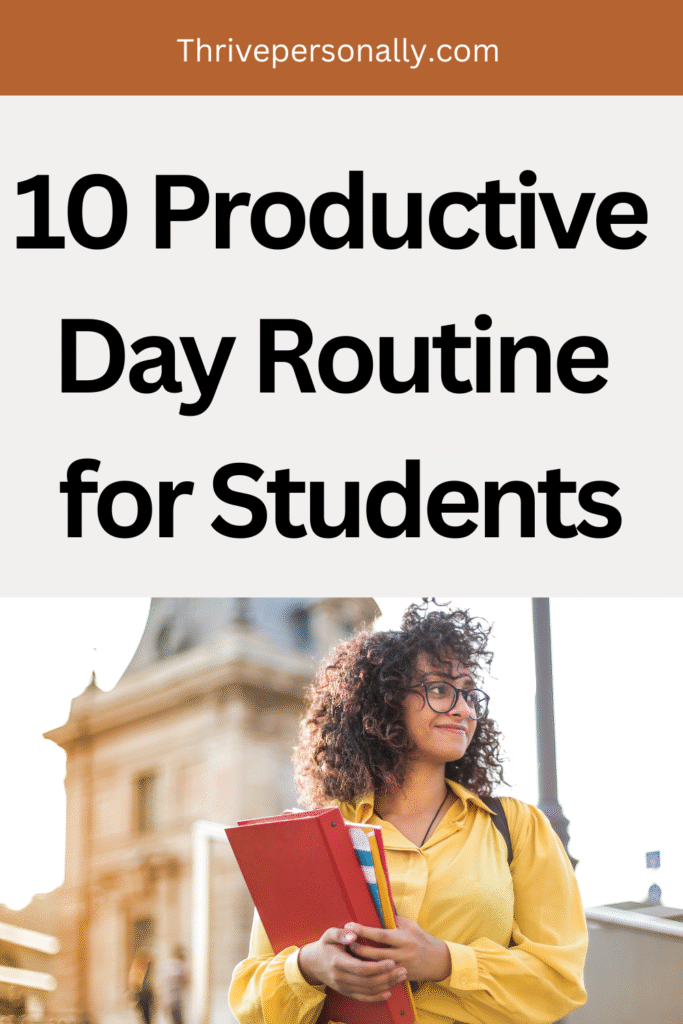When I learned how much the way you begin your day can shape your results, it completely changed my perspective. Routine is not just about time management—it aligns the mind and body in harmony. Students deserve a good routine, not one stuffed with endless activities, but one that balances focus with energy so that learning becomes lighter and more sustainable.
To be a productive learner, you need structure to guide you. It’s not about perfection, but about small, repeatable practices that make learning flow more smoothly.
10 Productive Day Routine Tips for Students
1. The Purpose of a Golden Morning
How you begin your morning sets the tone for the rest of the day. Waking up feeling hopeless leads to chasing your energy all day. By starting intentionally, you take control.
This doesn’t mean cramming chores into your mornings. It means creating a simple routine: wake at a good time, take a few quiet minutes to center your thoughts, and set small daily goals. Research shows your brain is most alert and healthy in the morning, making it the best time to tune your concentration (source).
Read also: 53 Creative Ways to Meet New People and Expand Your Social Circle
2. Plan Ahead for the Day
Successful students don’t guess what to do next. They prepare. Even a short outline of your priorities helps.
Planning ahead reduces decision fatigue—the mental exhaustion caused by too many choices. By deciding in advance what matters, you conserve energy for action. Whether you use a to-do list or time-blocking, having a vision for your day before it begins gives you direction.
Read also: How to Start Reading Books_10 Steps
3. Prioritize Intense Study Sessions
Studying longer doesn’t always mean studying better. What matters most is how and when you study.
Your schedule should include focused study sessions followed by short breaks. Research shows the brain can only maintain deep focus for a limited time before effectiveness drops (source). Breaking learning into smaller, concentrated chunks not only strengthens memory but also prevents burnout.
Read also: 7 Ways to Develop a Consistent and Effective Reading Culture
4. Stay Consistent with Class Attendance
It may seem minor, but attending classes regularly is one of the strongest habits you can form. Skipping class might feel harmless, but it creates gaps that weaken your learning foundation.
Consistency keeps you on track with material and builds discipline. Regular attendance establishes a steady pattern that makes productivity easier, since you’re not constantly trying to catch up.
5. Create an Uninterrupted Study Environment
Your environment shapes your productivity. If your surroundings constantly pull your attention away, focus becomes almost impossible.
A good habit is to design a space where your mind naturally concentrates: clear your desk, keep your phone out of sight, and study in a quiet room. Fewer distractions make it easier for your thoughts to stay on task.
6. Use Movement to Refresh Your Mind
An effective student doesn’t stay glued to one spot all day. Your body supports your mind, and movement sharpens both.
Short breaks for stretching, walking, or light exercise refresh concentration. Studies show that physical activity improves both memory and focus, helping students learn more effectively (source). Adding movement throughout your day keeps your body and mind strong.
7. Eat for Energy
What you eat directly affects your energy as a student. Unbalanced meals leave you tired, foggy, or unfocused.
You don’t need a complicated diet. The key is steady fuel—foods that provide long-lasting energy instead of crashes. When your body is properly nourished, your brain stays sharp and learning feels easier.
8. Protect Rest and Sleep
A tired mind is never productive. Many students believe staying up late helps them get more done, but in reality, lack of sleep weakens focus and memory.
Adequate rest is a foundation of successful learning. Studies show sleep is essential for storing information and performing well the next day (source). A strong routine prioritizes rest, because without it, none of the other habits work effectively.
9. Balance Work with Rest
Productivity isn’t about nonstop effort. True productivity requires balance. Build time for relaxation into your day, whether that’s meeting friends, praying, or enjoying hobbies.
This balance prevents burnout, refreshes your mind, and actually makes you more effective. Over time, balance streamlines your lifestyle and keeps your energy steady.
10. Reflect and Revise Daily
A good routine is not fixed—it grows with you. At the end of each day, pause to reflect. Ask yourself what worked well and what needs adjusting.
Reflection strengthens both self-discipline and awareness. By reviewing your progress, you refine your habits and take control of your growth.
Closing Thoughts
Student life is not simple, but it doesn’t have to be chaotic. Once you establish a daily practice that supports you, everything shifts. You save energy by avoiding indecision and move through your day with clarity.
These ten rituals focus on caring for both body and mind. They build a framework where productivity becomes natural, not forced. It’s not about perfection—it’s about consistency.
When you stay committed to these habits, your days won’t just be more productive. They’ll also feel lighter, more meaningful, and more aligned with your goals. Productivity isn’t about rushing—it’s about living each day in a way that makes sense and moves you forward.
Save the pin for later



